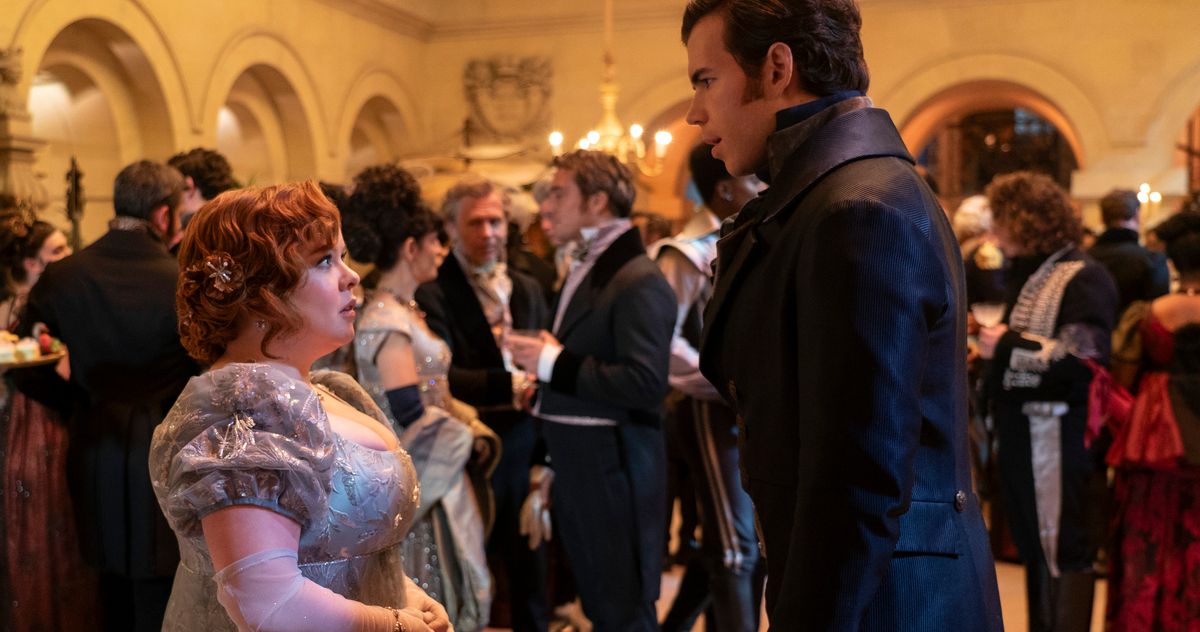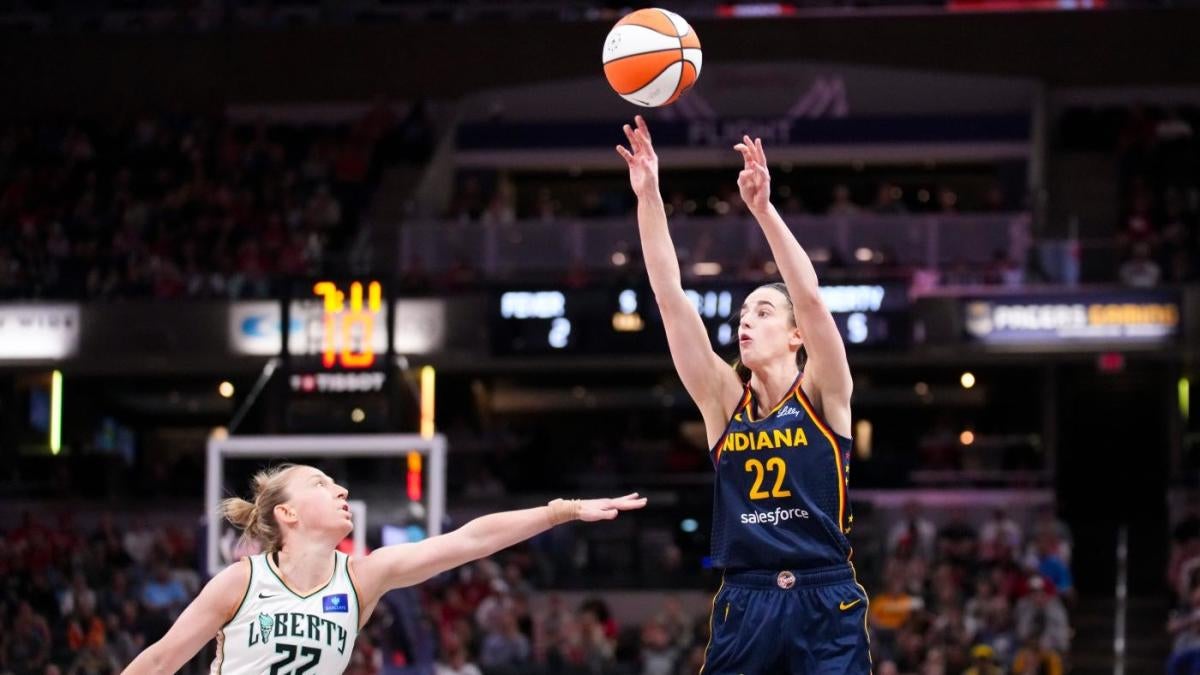But it almost doesn’t matter when the foreplay is this good.
Photo: LIAM DANIEL/NETFLIX
Spoilers for Bridgerton season three, part two follow.
Three seasons into its run, Bridgerton has fallen into a pattern: great at foreplay, iffy on the climax. No one signs up for a romance with the prospect of an underbaked conclusion, and it’s frustrating when the momentum and groundwork of a slowly built relationship culminates in a finale that’s just … fine. Still, Bridgerton’s third season, with its expansion of bubbly minor characters and ample time spent on the other Bridgerton siblings, reduces the pressure on this underperforming high point, and there’s enough fun and anticipation in everything around the central couple that it almost doesn’t matter that the apotheosis of Polin is more of a gentle plateau.
Like its first two seasons, this installment of Bridgerton is a delightful romp with towering heaps of confectionary-sweet silliness, an overlay of Barbie feminism, and the occasional baffling structural flaw. Every season of Bridgerton has some amount of imperfection, but each season is imperfect in its own way: Season one, sexy and unrestrained, was a mess of racial politics and reproductive anxiety coursing beneath the show’s fantasy of the Regency period. Season two, which included a somewhat more careful approach to the racial aspects of this universe, got pushback for not having enough sex and failing to adequately navigate the emotional ins and outs of its sisterly love triangle. In both cases, the season started from a promising premise but could not live up to the complexities of its own emotional stakes in the back half.
Season three is built for success. Both Colin Bridgerton and Penelope Featherington had plenty of time for development in seasons one and two, and Penelope’s identity as Lady Whistledown, anonymous author of the ton’s most influential gossip pamphlet, gives the Colin/Penelope match-up an immediate source of tension and an obstacle to overcome. Nicola Coughlan’s performance as Penelope is much-loved by the show’s fans, and beautifully calibrated to accomplish the shift from awkward side character to stunning central love interest. Luke Newton’s Colin is endearing, gentle, and more than capable of staring at Penelope with both longing and dismay. Colin loathes Lady Whistledown because of all the mean things she’s said about him and his family; Penelope’s secret is a buried bomb with a guaranteed explosive release.
Until the last couple of episodes, everything appears to be ripping along like a brand-new two-horse phaeton on a bright spring day. Colin and Penelope, after dealing with the emotional aftermath of their devastating balloon-based trauma, have a carriage-based digital exploration that launches them into giddy matrimonial accord. The Lady Whistledown secret lurks in the background, even while Colin and Penelope have one of the show’s lovelier and more tender sex scenes in their unfurnished future home. Everything’s ripe for a big, passionate, highly combustible, and ultimately satisfying conclusion! Except there’s a concerning absence of important groundwork with relation to Colin. While Penelope has a whole hidden life and ambitious desire for social influence, Colin had one underwhelming trip to Europe where he got less mail than he hoped and had to soothe himself with the Regency equivalent of a buy-ten-get-one-free brothel-membership card. He wants to be a writer, maybe, an idea introduced abruptly in the premiere, but he struggles to actually write anything even though he’s a wealthy man with lots of free time and the ability to publish whatever he wants. He wears a big Mr. Rochester–esque great coat and walks around with an unbuttoned shirt to signal his flirtation with Brontë-style masculine angst, but his sadness is unpersuasive at best and completely laughable at worst.
This is not necessarily a flaw with Bridgerton’s chosen storytelling setting, or its tendency to focus on wealthy aristocrats; this is a fantasy world where money almost never matters and all the rules of race, class, aristocratic titles, and the plausible load-bearing capacities of any given hair accessory are invented and discarded on a scene-by-scene basis. The problem is entirely structural. Without money or class concerns, tragedy, trauma, ambition, unfulfilled sexual desire, poor health, or even a hobby he’s particularly devoted to, Colin has no obstacles. He loves his neighbor! She’s hot for him! He has ample resources, the social standing to survive a scandal, and almost no responsibilities. He’s the most-desired bachelor of the season — he’s doing great! So when the inevitable fallout of Penelope’s secret identity finally reaches Colin, the betrayal and sadness that should feel equal on each side instead feel obnoxiously lopsided. Ideally, when two romantic leads clash, the audience should be able to sympathize with both parties, understanding whatever perspective is keeping them apart even if they’ll clearly work it out. But because Colin has so little growth over the course of the season, the viewer is mostly waiting for him to get over himself.
Unsurprisingly, this does not make for an ecstatic emotional reunion between the two. Penelope and Colin carry on with the wedding as planned, which creates the opportunity for even more heightened tension between them — they’re going to be stuck forever in this deeply miserable relationship! Except Bridgerton can’t fully commit to an angry wedding, and Colin smiles gently at Penelope as she walks down the aisle. This is lovely for two people who are trying to make it work and terrible momentum for a romance plot. Are they supposed to be fine now? Have they come to some sort of agreement? No, because Colin reverts to being furious with her after the wedding, and then everything is apparently solved once she publicly comes clean about Lady Whistledown in the finale. Even though they barely talk about it! And Penelope is clear-eyed about the problems still on the horizon! But there’s no reason for concern: They have a baby, Colin publishes his book, and everything is perfect in the end.
Despite this underwhelming conclusion for Polin, Bridgerton’s third season is still a compulsively enjoyable watch, in large part because the unfulfilled potential of the Polin plot is immediately passed along to engaging side characters and the promise of future seasons. Season three should be about Polin, but it really belongs to the Featheringtons, particularly Polly Walker’s Lady Featherington, who runs away with every scene she’s handed and juggles cruelty, pragmatism, fondness, exasperation, sadness, and love while also being infallibly funny. She and the two other Featherington sisters are the MVPs of this season, no contest.
Even without the Featheringtons, though, the Bridgerton siblings are given so much to do that as the Polin plot starts to cool off, their stories pick up the slack. The best and most outright absurd goes to Benedict (Luke Thompson), who engages in a sexual encounter that should win an improbable endurance award. And there’s lots of promise for Francesca (Hannah Dodd), as the finale introduces her love story with an intriguing potential shift for the future of the show. The Bridgerton world feels bigger than it has in the past, to its benefit: Story development for Cressida Cowper, Violet Bridgerton, and Lady Danbury and her newly introduced brother all bode well for new seasons. The expansion isn’t always successful, particularly for the Mondrich family, whom Bridgerton clearly wants to invest in but who, for this season, suffer from a near-fatal case of Colin Bridgerton Lack-of-Problems Syndrome. But these storylines are more than enough to counteract any potential Bridgerton fatigue. By the end of the season the overall sense is, “This was an unfortunate mess and I’d love to watch more immediately.”
In its efforts to build out the Bridgerton world, and to tell stories about more than one Bridgerton family member at once, the series has effectively embraced the narrative changes necessary to translate from a romance-novel series into a TV show. It’s also departed enough from Julia Quinn’s original books that it’s become completely its own work rather than a pale retelling of the original, which is always the most important standard for any adaptation. A Bridgerton series should be able to do both: embrace ensemble storytelling while also achieving the full satisfaction and painstaking structural balance of a romance novel. Season three does not pull this off, but Bridgerton remains too much fun to consider breaking up with anytime soon.
See All

Gregory Daniels is your guide to the latest trends, viral sensations, and internet phenomena. With a finger on the pulse of digital culture, he explores what’s trending across social media and pop culture. Gregory enjoys staying ahead of the curve and sharing emerging trends with his readers.








